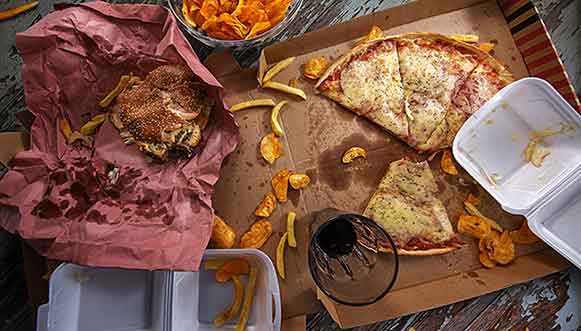Is Food Addiction Real?

If you or your clients have had trouble kicking the fast-food habit, or just can’t seem to say no to certain foods, you might have to cut them—or yourself—some slack. A new study confirms what has long been suspected: processed foods like chocolate, pizza and French fries can be highly addictive.
This is one of the first studies to examine specifically which foods may be implicated in “food addiction,” which has become of growing interest to scientists and consumers in light of the obesity epidemic.
Researchers recruited more than 500 participants for the study, which was divided into two parts. In Study One, 120 undergraduates completed the Yale Food Addiction Scale (YFAS) and were asked to identify which of 35 foods of varying nutritional value were most associated with addictive-like eating behaviors.

Ranking of 35 Foods Used in Study, From Most Problematic to Least
- Chocolate
- Ice cream
- French fries
- Pizza
- Cookie
- Chips
- Cake
- Popcorn
- Cheeseburger
- Muffin
- Breakfast cereal
- Gummy candy
- Fried chicken
- Soda (not diet)
- Rolls (plain)
- Cheese
- Pretzels
- Bacon
- Crackers (plain)
- Nuts
- Steak
- Granola bar
- Eggs
- Chicken breast
- Strawberries
- Apple
- Corn (no butter or salt)
- Salmon
- Banana
- Carrots (plain)
- Brown rice (plain, no sauce)
- Water
- Cucumber (no dip)
- Broccoli
- Beans (no sauce)
In Study Two, 384 participants were asked to rate how likely they were to have problems with each of the 35 foods. Researchers used a two-level regression analysis to evaluate which food-specific characteristics (such as fat content) were related to addictive-like eating behaviors, along with individual characteristics that might influence this association.
For Study One, researchers concluded that processed foods that were high in fat and on the high end of the glycemic index were most frequently associated with addictive-like eating behaviors. For Study Two, they found that the more highly processed a food was, the more likely it was associated with addictive-eating behaviors (see sidebar).
Previous studies in animals concluded that highly processed foods, or foods with added fat or refined carbohydrates (like white flour and sugar), may be capable of triggering addictive-like eating behavior. Furthermore, clinical studies in humans have observed that some individuals meet the criteria for substance dependence when the substance is food.
Unprocessed foods such as brown rice and salmon were not associated with addictive-like eating behavior.
Individuals with symptoms of food addiction or with higher body mass indexes reported greater problems with highly processed foods, suggesting some may be particularly sensitive to the possible “rewarding” properties of these foods, says Erica Schulte, a University of Michigan psychology doctoral student and the study’s lead author.
“If properties of some foods are associated with addictive eating for some people, this may impact nutrition guidelines, as well as public policy initiatives such as marketing these foods to children,” says Schulte.
“This is a first step toward identifying specific foods, and properties of foods, which can trigger this addictive response,” explains Dr. Nicole Avena, assistant professor of pharmacology and systems therapeutics at Icahn School of Medicine at Mount Sinai in New York City, and a co-author on the study.
And what does it mean for health and fitness professionals working with clients who want to lose weight or improve their diet? “This could help change the way we approach obesity treatment,” Says Dr. Avena. “It may not be a simple matter of ‘cutting back’ on certain foods, but rather, adopting methods that are traditionally used to curtail smoking, drinking and drug use.”
Future research should examine whether addictive foods are capable of triggering changes in brain circuitry and behavior like drugs of abuse, the researchers said.
More Articles
- ProSource™: April 2015
Maximize HIIT With Metabolic Strength Conditioning
Health and Fitness Expert
- ProSource™: April 2015
ACE-sponsored Research: Identifying the Best Method to Program Exercise Intensity
Contributor
- ProSource™: April 2015
Power Training: Advanced Exercise Program Design Strategies for Your Clients
Health and Fitness Expert
- ProSource™: April 2015
From the Experts: How to Become a Master Trainer
Health and Fitness Expert






